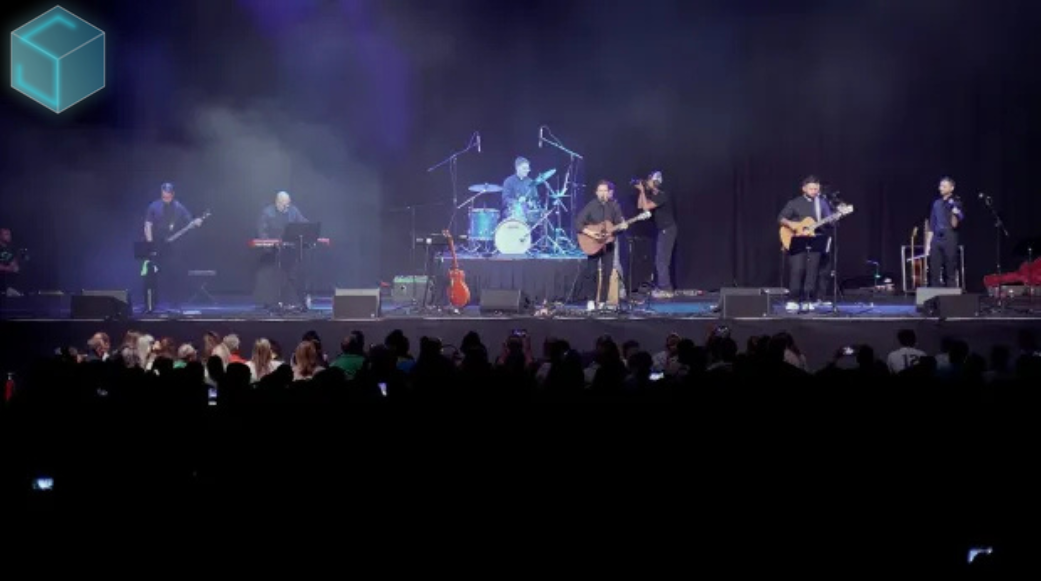
August 20, 2025
Imagine six Catholic priests performing at a sold-out Houston show instead of a well-known pop star. Their band's performance combined messages of prayer, celibacy, and faith with elements of rock...
Read more.png)
August 20, 2025
Nostalgia, Mother Mother’s latest album, is one of those rare creations. It invites us into a world where lightness isn’t escapism—it’s a form of resistance, a beacon of hope, and a path forward....
Read more
August 19, 2025
When Anna of the North released “Lovers” in 2017, it was already a dreamy synth-pop gem, filled with wistful vocals and lush production that captured the ache of young romance. But it wasn’t until...
Read more
August 19, 2025
“Let Me Know” ft. Future started out as a moody, late-night playlist type of track, the kind you blast in your car pretending you’re in a music video while stuck in traffic. But now? It’s become...
Read more
August 19, 2025
“Your Idol” stands out in Kpop Demon Hunters not just as a catchy track, but as one of the most self-aware songs in the whole project. At first listen, it has all the hallmarks of a classic K-pop...
Read more
August 19, 2025
If you’ve scrolled TikTok, Insta, or literally any corner of the internet in the past few weeks, you’ve probably heard it: the fizzy, feel-good bop known as “Soda Pop” by the Saja Boys. Straight...
Read more
August 19, 2025
Skai Is Yourgod didn’t just drop a song, he dropped a cultural grenade. His track “Stacks From All Sides” has taken TikTok by storm, and the secret sauce? A cheeky little sample from Beetle on...
Read more
August 19, 2025
After 70 weeks at No. 1 with “Too Sweet,” Hozier’s reign on Billboard’s Hot Rock Songs chart comes to an end as newcomer Sombr takes over with...
Read more
August 19, 2025
Charli XCX brought her groundbreaking Brat era to a poignant close Friday night during an electrifying performance at South Korea's One Universe Festival. The pop innovator marked the final...
Read more
August 19, 2025
Taylor Swift’s appearance on Travis and Jason Kelce’s New Heights podcast drew 1.3M live viewers, breaking YouTube records and sparking buzz with details about her new album The Life of a...
Read more
August 19, 2025
After a six-year silence, Chance the Rapper is officially back. On August 15, 2025, he will drop his sophomore album, Star Line, marking a new chapter filled with growth, travel, and creative...
Read more
August 19, 2025
Lana Del Rey’s new song takes aim at Ethel Cain, referencing an alleged personal rift involving Instagram posts, a mutual ex, and behind-the-scenes remarks...
Read more
Source: Travis Yewell/Unsplash
Music has the remarkable power to connect with our emotions, taking us on a rollercoaster ride of feelings and sensations. Whether it's a heartwarming melody that brings tears to our eyes or an upbeat rhythm that makes us want to dance, music profoundly affects the way we feel. This intrinsic relationship between music and emotions has fascinated researchers, musicians, and listeners for centuries. In this article, we will explore the diverse and profound effects of music on our emotional states.
The Science of Music and Emotions
The human brain responds to music in a complex and intricate manner. Studies have shown that when we listen to music, various brain regions associated with emotions, memory, and reward processing are activated. Certain melodies can trigger the release of neurotransmitters like dopamine, creating a sense of pleasure and euphoria. Moreover, music has the ability to synchronise neural activity, evoking strong emotional responses.
Different Types of Music, Different Emotions
The emotional impact of music can vary widely depending on the genre, tempo, and other musical elements. For example:
Music as a Mood Regulator
Have you ever noticed how music can help shift your mood? Whether intentionally or subconsciously, people often turn to music as a mood regulator. Listening to cheerful tunes on a gloomy day can brighten spirits, while melancholic music may provide a feeling of comfort in a way during times of grief. Music's capacity to align our emotional state with the mood of the music itself is a powerful tool for emotional self-regulation.
Music and Memory
Music has a unique ability to evoke vivid memories and emotions from the past. Certain songs can be intrinsically linked to specific life events, relationships, or experiences. The mere sound of a song can transport us back in time, eliciting nostalgic feelings or even helping individuals with memory impairments recall forgotten moments.
The Role of Culture and Individual Differences
It is essential to recognize that the emotional response to music is also influenced by cultural background and individual differences. What may evoke joy in one person might trigger sadness in another due to personal associations and experiences with certain melodies or rhythms. Cultural context plays a significant role in shaping musical preferences and emotional responses.
Music as Therapy
Given its profound impact on emotions and the brain, music has found applications in therapeutic settings. Music therapy is an established practice used to help individuals manage stress, alleviate depression, improve cognitive function, and even reduce physical pain. The rhythmic patterns and harmonious arrangements in music stimulate neural connections and promote emotional well-being.
Music's power to affect the way we feel is undeniable. From generating feelings of joy and excitement to providing solace during difficult times, music has an unparalleled ability to connect with our emotions. Whether you're a devoted music enthusiast or someone who occasionally hums a tune, music remains an influential force that enriches our lives and touches us on a deeply emotional level. So, next time you hear a song that resonates with you, let it embrace your emotions and take you on a soul-stirring journey.